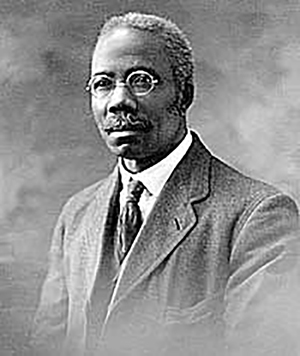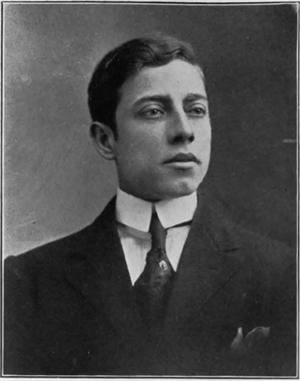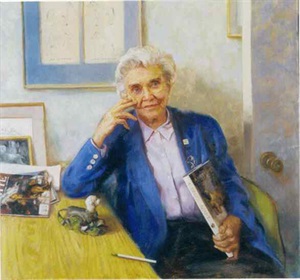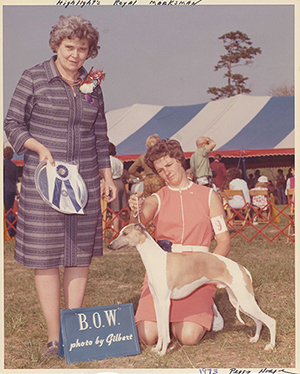Diversity in Our History
At the University of Pennsylvania School of Veterinary Medicine, we are exceedingly proud of our "firsts." Our first African American VMD, Dr. Augustus N. Lushington, graduated in the class of 1897. He was followed by our first Latinx graduate, Dr. José de Acosta, from Cuba, who graduated in 1907. Our first woman graduate was Dr. M. Josephine "Jo" Deubler, who graduated in 1938 from Penn Vet and went on to earn both an MSc and PhD in 1944, the first woman to earn those degrees from the University of Pennsylvania.
Dr. Augustus Nathaniel Lushington, V'1887
 This photograph of Dr. Nathaniel Lushington, V'1897 hangs in the School's lobby.
This photograph of Dr. Nathaniel Lushington, V'1897 hangs in the School's lobby.
Born in Trinidad in 1869, Augustus Nathaniel Lushington was the first American of African descent to earn a VMD degree from the University of Pennsylvania School of Veterinary Medicine (then known as the Veterinary Department at the University of Pennsylvania) in 1897.
Dr. Lushington’s grandfather was brought to Trinidad as a slave to work on the island’s sugar plantations. Finding few opportunities to work in Trinidad, Lushington moved to Binghamton, New York, and married a woman from Antigua.
Thanks to the Binghamton West Indian community's support, he was able to enroll in and graduate from Cornell University. From there, Lushington moved to Philadelphia to complete his VMD, which he did in three years.
-
Read more about Dr. Lushington, V'1887
After graduation, Dr. Lushington moved his family to teach at the Agricultural College in Rock Castle, Virginia. South-central Virginia offered an ideal environment for a veterinarian and Dr. Lushington decided to set up a veterinary practice in Lynchburg.
He treated cows, horses, and other working livestock, often walking for miles through the woods from Lynchburg to reach the farms where his services were needed. However, white farmers took advantage of Dr. Lushington’s services, neglecting to pay him, an offense Dr. Lushington could hardly contest in the repressive atmosphere of the South in the early 1900s.
As a result, the young veterinarian often took jobs on the side to pay the family bills. He worked as an agricultural statistics reporter for the USDA’s Bureau of Animal industry, as a meat inspector, and even as a probation officer on weekends.
Dr. Lushington worked until his death in 1939 at the age of 69 years. He was well respected as a veterinarian by his community and was honored posthumously by the University of Pennsylvania.
Dr. José de Acosta, V'1907
 The image of Dr. de Acosta is courtesy of the University of Pennsylvania Archives
The image of Dr. de Acosta is courtesy of the University of Pennsylvania Archives
Not much is known about the School of Medicine’s first Latinx graduate, José de Acosta. Born in Cuba in 1881, de Acosta came to the United States when he was 16 years old. He attended the Keystone State Normal School in Kutztown, Pennsylvania (which later became Kutztown University), where students of high school age trained to become teachers. After he graduated, he attended New York University before matriculating in the Veterinary Department of the University of Pennsylvania in 1907.
While studying at the School, Dr. de Acosta won the anatomy prize for his second year’s work. He was also known for his fashionable attire, “his ideal pleasure on Sunday afternoon, driving along Woodland Avenue in a Victoria…”, and as a “gentleman of leisure” who appreciated the finer things in life. He was also a great storyteller.
Dr. M. Josephine "Jo" Deubler, V'1938, GR'1944
 The original portrait of Dr. Duebler, painted by artist Mary White, hangs in the School's lobby
The original portrait of Dr. Duebler, painted by artist Mary White, hangs in the School's lobby
M. Josephine “Jo” Deubler grew up around animals, both small and large, and was herself an accomplished horsewoman.
She hailed from a long family legacy of veterinarians, including her father, Ernest C. (V’1911), brother, James A. (V’1943), uncle, Ezra S. (V’1905) and two cousins, Leonard P. (V’1938) and James. In addition to her VMD, Dr. Duebler was the first woman to earn graduate degrees at the University of Pennsylvania, receiving an MS degree in 1941 and PhD in 1944.
When Dr. Deubler entered vet school, she had a serious hearing problem, for which she compensated by learning to lip-read in lectures. Her graduate thesis was on periodic ophthalmia in horses, and she spent several years at Jefferson Medical College in Philadelphia teach tropical medicine.
-
Read more about Dr. Deubler, V'1938, GR'1944
 This photo of Dr. Duebler and her dog comprise part of Dr. Duebler's personal photography collection
This photo of Dr. Duebler and her dog comprise part of Dr. Duebler's personal photography collection
While she worked as a pathology assistant for more than a decade, Dr. Deubler finally joined the faculty at the School in 1955 as an assistant instructor and eventually professor of pathology.
Her research ranged from feline panleukopenia to bovine keratitis, but her true passions were dog breeding and showing. She became a dog show judge in 1960 and quickly earned an international reputation. She owned and bred Smooth Fox Terriers, Irish Terriers, Kerry Blues, Dachshunds, and her favorite, Dandie Dinmont Terriers. In fact her Dandies took Best of Breed at Westminster in 1956.
Dr. Deubler was an active alumna, serving the School as a class agent, secretary and historian of the Veterinary Medical Alumni Society, secretary/treasurer of the Bucks-Montgomery Veterinary Medical Association, and secretary of the Philadelphia Animal Rescue League. She was a driving force behind the School’s annual canine and feline symposia. Dr. Duebler received numerous awards for her tireless efforts on behalf of veterinary medicine. In 1987 a scholarship fund at Penn was established in her name, as well as several endowed professorships. In 1994, she was awarded the School of Veterinary Medicine’s highest accolade, the Centennial Medal.
The School of Veterinary Medicine established the Josephine Deubler Genetic Disease Testing Laboratory, which is part of a service that encompasses a genetic testing and counseling program in Penn Vet’s Section of Medical Genetics. The bridge connecting Hill Pavilion and Ryan Veterinary Hospital is also named after Dr. Josephine Deubler—a fitting testament to connect Penn Vet’s newest building of teaching and discovery, to the companion animal Ryan Veterinary Hospital and the historic Old Vet Quad.
She served on the school faculty until 1987, keeping an office in the Ryan Veterinary Hospital into the 2000s.